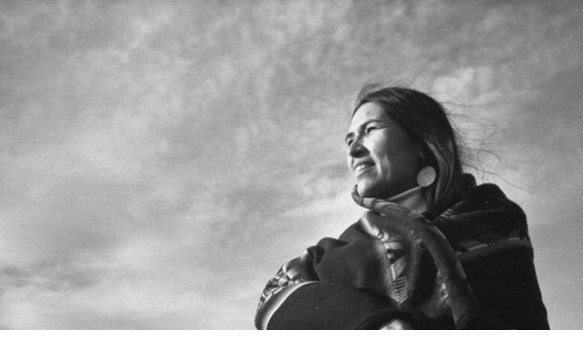SAY WHAT? - It's an apt day to pay tribute to Native American actress and activist Sacheen Littlefeather, who died earlier this month after a lifetime of "keeping my voice and the voices of (our) people alive" - most famously, in a commanding, 60-second speech at the 1973 Academy Awards when she rejected an award on behalf of Marlon Brando to protest "the treatment of American Indians (by) the film industry." A 26-year-old member of the Screen Actors' Guild, she was the first woman of color and the first indigenous woman to use the Awards to make a political statement - now, a common gesture, but at the time a radical act by a gutsy young woman who'd lived a hard life "between two worlds." Her father was a mix of Apache and Yaqui, her mother was white, both were mentally ill and unable to care for her; in her teens, confused about her identity, she'd had a breakdown: "I could not tell the difference between me and my pain." But amidst the birth of a Native American rights movement in the 1960s and early 70s, she began visiting reservations, traveling to activist actions and re-learning Native traditions: "The old people...taught us young people how to be Indian again. It was wonderful."
In her early 20s, working at a San Francisco radio station and for affirmative action for Native Americans, she became friends with Marlon Brando, a longtime advocate for Native rights, through her neighbor Francis Ford Coppola. In the run-up to the 45th Academy Awards, where Brando had been nominated for best actor in The Godfather; she "fulfilled the request of a friend and ally" and agreed to read a rejection speech on his behalf if he won. "I knew (the) importance of representing all Native people on that night," she said years later. "I (knew) the impact of what 60 seconds at the Academy Awards can mean." The backstory to the speech was a slapdash affair: Half an hour before his win, she was at Brando's house waiting for him to finish typing an 8-page speech. She arrived at the ceremony in her buckskin dress minutes before his win was announced; she was promptly confronted by producer Howard Koch, who after some discussion said she could have 60 seconds on stage, after which she would be removed. She had promised Brando she would not touch the statue, and she had promised Koch to keep to 60 seconds, she wryly noted years later: "So, not under any pressure at all."
The result was an improvised speech of astounding grace, power and composure. Gently pushing away the Oscar, she told the glittering crowd, with millions watching on TV, that Brando "very regretfully cannot accept this very generous award." Citing the industry's mistreatment of Native Americans and the current stand-off at Wounded Knee that had met with a media black-out - and calmly injecting, "Excuse me" when interrupted by boo-ing - she ended with the hope that, "In the future, our hearts and our understandings will meet with love and generosity.” The response from the audience was a mix of anger, support and bafflement: "They didn't know what to make of it," she recalled, stressing that "it wasn't a performance - it was real." "I didn't use my fist. I didn't use swearwords. I didn't raise my voice. But I prayed that my ancestors would help me. I went up there like a warrior woman. I went up there with the grace and beauty and courage and humility of my people. I spoke from my heart." In the years after her appearance, she had trouble finding acting work - "I was a hotbed of controversy" - and she and Brando drifted apart. "We had our time together," she said. "We made history together."
At 29, seriously ill with lung disease, Littlefeather began studying holistic health, became a health consultant to Native communities, reconnected with the Catholic Church and learned to synthesize Catholic and Native religious practices; at one point, she led healing circles that held buffalot dances in the middle of mass. "This is how I saved my life," she said, "by blending the two together, living peacefully side by side." She remained active in Native advocacy, and a documentary, Breaking the Silence, told her story. Months before her death at age 75 of mestastisized breast cancer on Oct. 2, the Academy issued an official apology for "the abuse you endured" and her too-long-unacknowledged courage 50 years before. To honor her and all indigenous voices, "the original storytellers," the Academy also held "an evening of healing, conversation and celebration" featuring Littlefeather. Though weeks before her death, Littlefeather was wry, gracious and still determined to decry "a society that deliberately set out to erase the existence and diversity of Native peoples." Through genocide and oppression, she noted, "Our generation remained hard at work, and we were not the only ones." En route to "the spirit world...the world of my ancestors," she said, "I've earned the right to be my true self."
"When I am gone, always be reminded that whenever you stand for your truth, you will be keeping my voice and the voices of our nations and our people alive," she concluded. "I remain Sacheen Littlefeather. Thank you."
(Abby Zimet has written CD's Further column since 2008. A longtime, award-winning journalist, involved in women's, labor, anti-war, social justice and refugee rights issues. Email: [email protected])






